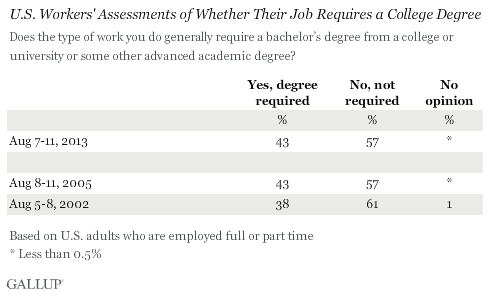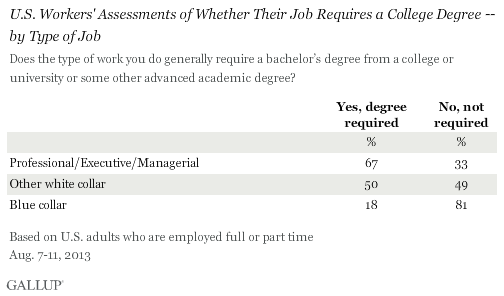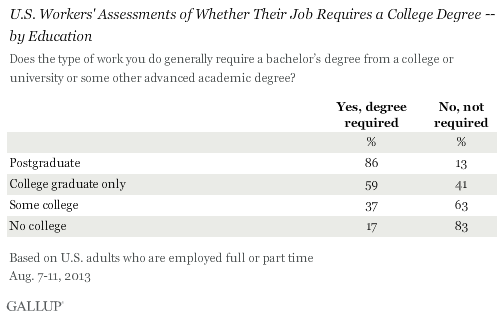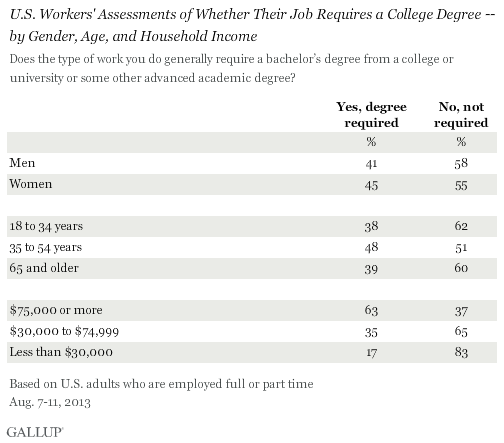PRINCETON, NJ -- Fewer than half of adults employed full or part time in the United States, 43%, say the type of work they do generally requires a bachelor's or a more advanced degree. Fifty-seven percent say it does not, unchanged from 2005, but down slightly from 61% in 2002.

Two-thirds of workers with professional, executive, or managerial jobs say a college degree is needed in their line of work. Among those in all other white-collar jobs, the rate drops to 50%, with an equal number saying a college degree is not necessary. The great majority of those in blue-collar jobs say their work does not require a bachelor's degree or greater. The plurality of Americans, 42%, hold a professional job, 38% some other white-collar position, and 18% are in blue-collar jobs.

Four in 10 College Grads Say Their Work Doesn't Require a Degree
The bulk (86%) of postgraduates say they are doing a job that requires at least a college degree. At the other end of the spectrum, large majorities of those with less than a four-year degree or no college experience say a college degree isn't required for what they do -- although, interestingly, between 17% and 37% say it is.
In between are workers who earned a bachelor's degree, but no more. Employment among members of this group appears less linked with their academic credentials, because while 59% say a college degree is needed for what they do, 41% say it is not.

Some of the discrepancy between college attainment and work credentials could involve respondents' interpretation of the word "require." Some may be responding on the basis of the academic credentials their employer looks for in job candidates. Others could be thinking about the skills required to do the job. Nevertheless, the discrepancy is clearly widest for four-year college grads, as well as those with "some college."
High Income and College Go Together
There is no real difference between male and female workers' perceptions of their need for a college degree, and there are only slight differences by age, with middle-aged workers the most likely to say their job requires a degree.
However, there are significant differences by income, with the majority of workers earning $75,000 or more saying a degree is necessary, compared with no more than a third of lower-income workers.

Bottom Line
The majority of high school graduates in the U.S. go straight to college, no doubt believing that a college degree will open career doors and unlock higher lifetime earning potential. Positive expectations about attending college are generally well founded: government statistics show that four-year college graduates will earn roughly double what college nongraduates make over their lifetime -- amounting to an additional million dollars. Gallup's data also show a strong earnings-college connection in the workforce, whereby high-income jobs are still dominated by college graduates, while college nongraduates by and large hold middle- to low-income jobs.
However, changes in the nation's economy in the past decade, coupled with a revolution in technology, may be challenging the traditional college bargain. The high tuition and lost-opportunity costs associated with spending four or more years getting a bachelor's degree may not be as palatable when weighed against a persistently anemic job market. This concern could be particularly strong for students who intend to stop at a four-year degree. With four in 10 employed four-year college graduates saying a college degree is not required for the work they do, students may increasingly look at technical training, online education, self-directed learning, and internships as more affordable alternatives to the traditional college path.
Survey Methods
Results for this Gallup poll are based on telephone interviews conducted Aug. 7-11, 2013, with a random sample of 1,039 adults who are employed full- or part-time , aged 18 and older, living in all 50 U.S. states and the District of Columbia.
For results based on this sample, the margin of sampling error is ±4 percentage points.
Interviews are conducted with respondents on landline telephones and cellular phones, with interviews conducted in Spanish for respondents who are primarily Spanish-speaking. Each sample of national adults includes a minimum quota of 50% cellphone respondents and 50% landline respondents, with additional minimum quotas by region. Landline and cell telephone numbers are selected using random-digit-dial methods. Landline respondents are chosen at random within each household on the basis of which member had the most recent birthday.
Samples are weighted to correct for unequal selection probability, nonresponse, and double coverage of landline and cell users in the two sampling frames. They are also weighted to match the national demographics of gender, age, race, Hispanic ethnicity, education, region, population density, and phone status (cellphone only/landline only/both, and cellphone mostly). Demographic weighting targets are based on the March 2012 Current Population Survey figures for the aged 18 and older U.S. population. Phone status targets are based on the July-December 2011 National Health Interview Survey. Population density targets are based on the 2010 census. All reported margins of sampling error include the computed design effects for weighting.
In addition to sampling error, question wording and practical difficulties in conducting surveys can introduce error or bias into the findings of public opinion polls.
View methodology, full question results, and trend data.
For more details on Gallup's polling methodology, visit www.gallup.com.
